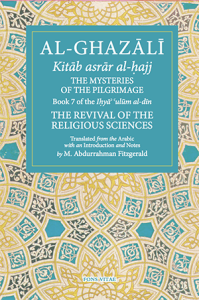Al-Ghazali The Mysteries of the Pilgrimage (Ihya Ulumuddin Series No. 7)

Author: Imām Al-Ghazali
Translator: M. Abdurrahman Fitzgerald
Publisher: Fons Vitae Publishing
Year of Publication: 2021
Print Length: 160 pages
Genre: Islamic Studies / Quranic Studies; Theology, Ethics and Philosophy; Islamic Law & Jurisprudence, Science; Qur’anic Reflection, Supplication & Prayers; Non-Fiction / Religious Studies
Topic: Islam, Qur’an, Pilgrimage (Hajj), Pillars of Islam, Islamic Pillars of Faith
Abu Hamid al-Ghazali discusses the fundamentals and inner meanings of the pilgrimage, including its pillars, preconditions, and obligations. The book begins with an introduction on the merits of the pilgrimage and its rewards. Al-Ghazali explains the Qur’anic statement announcing the pilgrimage: And proclaim to the people the pilgrimage: “…they will come to you on foot and on every lean camel; they will come from every distant pass–that they may witness benefits for themselves and mention the name of God on known days over what He has provided for them of [sacrificial] animals.”
Table of Contents
Editor’s Note
Biography of Imām al-Ghazālī
About the Revival of the Religious Sciences
Translator’s Introduction
Acknowledgments
THE MYSTERIES OF THE PILGRIMAGE
al-Ghazali’s Introduction
Chapter 1: On the Merits of the Pilgrimage, Mecca, and the Ancient House
1. On the Merits of the Pilgrimage
2. On the Conditions for the Validity of the Pilgrimage
Chapter 2: On the Order of the Outward Actions from the Beginning of the Journey Until the Return
1. The Eight [Actions] from the Initial Departure
2. The Five Actions on Entering Iḥrām
3. The Six Actions… from Mecca up to the Ţawāf
4. The Circumambulation (Ţawāf)
5. The Course (Sa’ī)
6. The Standing (Wuqūf) at ‘Arafa and What Precedes It
7. On the Remaining Rites of the Pilgrimage
8. A Description of the Visit (‘Umra)
9. On the Ţawāf of Farewell
10. On the Visit to Medina
A Section on the Sunna of Returning from a Journey
Chapter 3: On the Detailed Rules of Conduct and Inward Practices
Ten Detailed Rules of Conduct:
[Expenditures] / [Taxes] / [Provisions] / [Behavior] / [Modes of Travel] / [Conveyances] / [Outward Appearance] / [Treatment of Animals] / [Sacrifice] / [Disposition]
An Explanation of the Inner Practices
[Understanding] / [Longing] / [Resolve] / [Attachments] / [Provisions] / [Conveyances] / [Purchasing the Iḥrām] / [Departure] / [The Journey] / [Entering Iḥrām] / [Mecca] / [Seeing the House] / [The Ţawāf] / [The Black Stone] / [The Curtain] / [The Course] / [‘Arafa] / [The Pebbles] / [The Sacrifice] / [Medina]
Bibliography
Indexes: Index of Qur’ānic Verses / Index of Hadīth / Index of Supplications and Invocations / Index of People and Places / Subject Index
About the Translator

Imām Abu Hamid al-Ghazali is a 11th century Muslim scholar. He was one of the most prominent and influential philosophers, theologians, jurists, and mystics of Sunni Islam. Al-Ghazālī was born at Ṭūs (near Mashhad in eastern Iran) and was educated there, then in Jorjān, and finally at Nishapur (Neyshābūr), where his teacher was al-Juwaynī, who earned the title of imām al-ḥaramayn (the imam of the two sacred cities of Mecca and Medina). He was active at a time when Sunni theology had just passed through its consolidation and entered a period of intense challenges from Shiite Ismâ’îlite theology and the Arabic tradition of Aristotelian philosophy (falsafa). Al-Ghazâlî understood the importance of falsafa and developed a complex response that rejected and condemned some of its teachings, while it also allowed him to accept and apply others. His great work, Iḥyāʾ ʿulūm al-dīn or Ihya Ulumuddin (“The Revival of the Religious Sciences”), made Sufism (Islamic mysticism) an acceptable part of orthodox Islam.
Source: https://plato.stanford.edu/entries/al-ghazali/
More from Imam al-Ghazali in this library, click here.

Michael Abdurrahman Fitzgerald is the Director of the Center for Language and Culture, Marrakech, and the author of several books, including Ibn Qayyim al-Jawziyya on the Invocation of God.
Source: https://www.barnesandnoble.com/w/the-mysteries-of-the-prayer-and-its-important-elements-michael-abdurrahman-fitzgerald/1128932461
More from M. Abdurrahman Fitzgerald in this library, click here.
